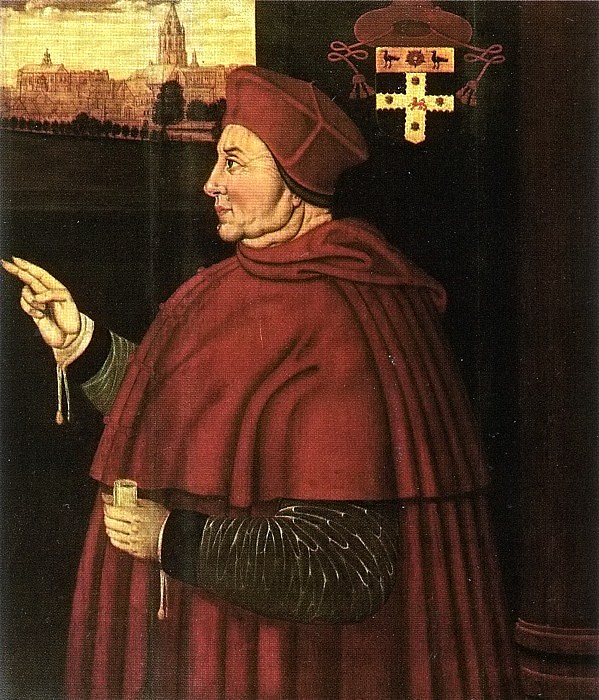
So many of the anti-Semitic accusations against Shakespeare's play, 'The Merchant of Venice' rely on Antonio, the Merchant of the title, being seen as 'Innocent, Christian Victim' that I am surprised a lot more attention hasn't been focused on the validity of the assumption.
Actually, I am not surprised.
Antonio is such an anodyne wimp and Shylock such a dynamic powerhouse that any focus on the former at the expense of the later is bound to seem wasted: The same is true of Milton’s Satan – now there’s a scene stealer is ever there was one – poor old god left right out in the celestial cold.
And then there is the circular argument – Elizabethan England was anti-Semitic – we all know that – after all, Shylock’s portrayal is one of the main pieces of evidence isn’t it?
Strange then how many of the great Shylock performances of recent times crack the cliché and reveal not a ‘stereotype Jew’ but a very human, if flawed, character.
But there – you see – hoisted by my own petard - off the subject of Antonio and onto Shylock!
The play starts with Antonio walking on (as though through the streets of Venice) with some friends and he answers a question which must have been asked offstage – the conversation going something like,
Friend: Why are you so miserable? This sadness is very boring!
Antonio: In sooth, I know not why I am so sad.
Cue Romeo (Aye me . . .); Cue Hamlet. Oh the moans, the moans!
Any but the most drunken groundling jumps straight to the point – Melancholy: Quite a fashionable disease at the time – every self-respecting artist, musician or unemployed scholar (not to mention teenage lover) donned the black hat and sighed bad breath over his friends (sorry ladies, women had to go for the hysterics).
Antonio is striking a note of dissonance right from his first “oooooo th” – and there are more to come.
He continues:
It wearies me; you say it wearies you;
Get the feeling he couldn’t give a monkey’s?
But how I caught it, found it, or came by it,
What stuff ‘tis made of, whereof it is born,
I am to learn;
And that’s a half line – cue for a big pause.
Plenty of time for the audience to answer his questions – black bile. Too much earthy heaviness – several potential causes: Several types – so, what’s unbalanced this guy: Unbalanced? Yep – he is suffering from an excess of bile, he is out of harmony with not only the world, but his maker.
And then he jumps in with,
And such a want-wit sadness makes of me
That I have much ado to know myself.
So Antonio has nailed his flag to the mast.
But hold on – Much Ado? Not about nothing surely? And, ‘want-wit’? And, not to know myself?
Either he is serious – as this bunch of friends think; or he is posing – as Gratiano suggests later in the scene.
An interrogation follows – following good Elizabethan medical theory.
As a melancholic, Antonio is under the influence of Saturn – he will exhibit sadness, contrariness and deliberation; earth is the dominant element with the attributes of cold, dry, black sourness. A quick look at Durer’s ‘Melancholia 1’ reveals the ‘gifts’ of Saturn – numbering, measuring counting (land and money) – all low, earthly occupations.
Salerio assumes this is where the source of the Antonio’s trouble lies – excessive worry over his material possessions. Solanio backs him up (both giving essential plot details). Salerio returns with more – jointly giving a total of over 30 lines on the worries of being a merchant. How many in that first London audience must have recognised their daily concerns. The recent discovery off the coast of Cornwall of a vast sunken treasure in silver and gold only adds weight to the assumptions of his friends.
Antonio denies the diagnosis – incidentally confirming his melancholic ‘strengths’ of counting, numbering and deliberation. But am I talking about the merchant or the moneylender? It certainly seems to me as though they are two sides of the same coin.
Solanio makes his second, wild guess – love!
Quickly, and contemptuously, dismissed (although many modern productions choose to ignore this dismissal and try to hang Antonio’s character on a secret homosexual love – I suppose it gives the modern method actor something to worry away at, even though it has nothing to do with what Shakespeare intended).
Solanio seems to give in at this point – you have inherited the sadness from nature – but he does bring up ‘two-headed Janus’ – which again suggests, to me, Shylock and Antonio as aspects of a single unity.
We have not got to a solution when Bassanio, Lorenzio and Gratiano enter – and instantly Solanio bids goodbye:
Fare ye well;
We leave you now with better company.
If Solanio has made the Melancholic diagnosis, then the cure includes companionship, unburdening of the heart, and peace of mind (and music and drama) – all designed to ‘lighten’ the humours and restore balance. He and Salerio are not doing too well – although they are trying – they have business to go to, and that is the last thing Antonio needs to be thinking about – so, a quick exit is called for.
Antonio, sourly, thanks them for their company and doesn’t fail to point out that they are ‘embracing the occasion’ to depart.
This is true – but what is the motive?
Well, that’s a very 20th Century question – Shakespeare, having set the scene of a Melancholic ‘Title’ character, now needs to move the plot on a bit – and introduce a second theme, friendship.
Bassanio is Antonio’s friend – Solanio and Salerio, like Romeo’s mother and father, withdraw to let friends talk and, hopefully, ‘unburden’.
But before that can happen, there is a last stab at the diagnosis – this time from a straight talking Gratiano.
He assumes ‘care’ about earthly things is the cause – and points out how greatly changed Antonio is.
This is one of those important indicators that slip through – how does Gratiano know? What is Antonio doing that is ‘changed’? Surely, like Hamlet, we have visual as well as reported indicators. Antonio must be in black – reduced in finery? Hence the constant assumption ‘material wealth’ is at the bottom of the Melancholy.
Antonio now comes out with the much quoted:
I hold the world but as the world, Gratiano –
A stage, where every man must play a part,
And mine a sad one.
This, of course, is the ‘All the World’s a Stage’ thought – it is, additionally, the ‘How weary, stale, flat and unprofitable; Seems to me all the uses of this world’ of Hamlet.
It is also a half line ending – and Gratiano, not taking this ‘feigned’ nonsense, leaps straight in, playing the fool.
Standard medical treatments are recommended – and an interesting accusation – some men wilfully take on the mantle of Melancholy in order to seem wise – and Antonio doesn’t actually deny this, but says he will talk more.
What are we to make of Antonio’s Melancholy?
Well, the first important point is that Antonio cannot be seen as an example of Christian virtue, in harmony with his maker.
Melancholy, whether feigned or real was an indication of dispair – one of the greater sins to your average Elizabethan – it represented a refusal to enter into a relationship with god.
Next there is the question of the type of Melancholy – and we have dismissed the major contenders – concern for business and love – which leaves us with two further possibilities, ‘The Intellectual’ (indicated by Gratiano) or one not mentioned – The Malcontent.
It was the Malcontent who, finding no place in the social system, joined the extreme religious sects – such as the Puritans or, in Elizabethan England, the Catholics.
And Angelo is most likely in black – just as Malvolio.
Antonio to the groundlings of The Globe, would be seen as a potential figure of fun – and a joke will be played on him which is as cruel as that played on Malvolio. Black humour certainly, arising from the black humor of bile.
But knowledge of this also prepares the audience to expect from Antonio statements of an extreme nature:
The perturbations of melancholy are for the most parte, sadde and fearful, and such as rise of them: as distrust, doubt, diffidence, or dispaire, sometimes furious and sometimes merry in apparaunce, through a kinde of Sardonian, and false laughter, as the humour is disposed that procureth these diversities. Those which are sad and pensive, rise of that melancholick humour, which is the grossest part of the blood, whether it be iuice or excrement, not passing the naturall temper in heat whereof it partaketh, and is called cold in comparison onely. This for the most part is setled in the spleane, and with his vapours anoyeth the harte and passing vp to the brayne, counterfetteth terrible obiectes to the fantasie, and polluting both the substance, and spirits of the brayne, causeth it without externall occasion, to forge monstrous fictions, and terrible to the conceite, which the iudgement taking as they are presented by the disordered instrument, deliuer ouer to the hart, which hath no iudgement of discretion in it self, but giuing credite to the mistaken report of the braine, breaketh out into that inordinate passion, against reason.
- Timothy Bright, A Treatise of Melancholie, (1586), Facsimile Text Society, New York, 1940. p.102.
Taken in this light, the strong anti-jewish sentiments expressed by Antonio cannot be seen as inherent anti-Semitism either in the play or in the playwright.
(Appologies for the not quite right layout - Blogger ain't behaving!









